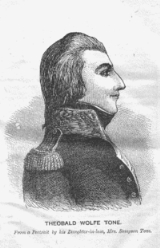
Theobald Wolfe Tone
Theobald Wolfe Tone commonly known as Wolfe Tone, was a leading figure in the United Irishmen Irish independence movement and is regarded as the father of Irish republicans.
Cited in Celtic Identity and the British Image by Murray G.H. Pittock (1999) pg 123
Sourced
- From my tenderest youth I have considered the union of Ireland with Great-Britain as the scourge of the Irish nation. And that the people of this country can have neither happiness nor freedom whilst that connection endures. Every day's experience, and every fact that arose, convinced me of this truth; and I resolved, if I could, to separate the two countries. But as I knew Ireland could not of herself, throw off the yoke, I sought for help wherever I could find it.
- Speech to the Court-Martial, assembled to pass sentence on his life (November 10, 1798) http://rewinn.com/8043.html
- I have laboured to abolish the infernal spirit of religious persecution by uniting the Catholics and Dissenters. To the former, I owe more than ever can be repaid. The service I was so fortunate as to render them they rewarded munificently but they did more: when the public cry was raised against me, when the friends of my youth swarmed off and left me alone, the Catholics did not desert me. They had the virtue even to sacrifice their own interests to a rigid principle of honour. They refused, though strongly urged, to disgrace a man who, whatever his conduct towards the Government might have been, had faithfully and conscientiously discharged his duty towards them and in so doing, though it was in my own case, I will say they showed an instance of public virtue of which I know not whether there exists another example."
- Theobald Wolfe Tone [from the dock, to the people] on the occasion of his Court-Martial
Attributed
- Strum, strum and be hanged
- Comments to a gathering of harpists (1792)
Cited in Celtic Identity and the British Image by Murray G.H. Pittock (1999) pg 123
An Argument on Behalf of the Catholics of Ireland by a Northern Whig. (September, 1791)
From Ireland Her Own, T. A. Jackson, Lawrence & Wishart, London, 1976- [T]hey and the Catholics had but one common interest and one common enemy; that the depression and slavery of Ireland was produced and perpetuated by the divisions existing between them; and that consequently to assert the independence of their country, and their own individual liberties it was necessary to forget all former feuds, to consolidate the entire strength of the whole nation, and form for the first time but one people.
- His objective was to convince the Dissenters to join with their fellow countrymen.
- The Revolution of ’82 (1782) was a revolution which enabled Irishmen to sell at a much higher price their honour, their integrity, and the interests of their country; it was a revolution which while at one stroke it doubled the value of every borough monger in the Kingdom, left three-fourths of our countrymen [Catholics] slaves as it found them, and the Government of Ireland in the base, wicked and contemptible hands who had spent their lives plundering and degrading her … Who of the veteran enemies of the country lost his place, or his pension? Not one. The power remained in the hands of our enemies, again to be exerted for our ruin, with this difference, that, formerly, we had our distresses gratis at the hands of England, but now we pay very dearly to receive the same with aggravations at the hands of Irishmen—yet this we boast of and call a Revolution.
- To subvert the tyranny of our execrable government, to break the connection with England, the never-failing source of all our political evils, and to assert the independence of my country, these were my objects. To unite the whole people of Ireland, to abolish the memory of past dissensions, and to substitute the common name of Irishman, in place of the denominations of Protestant, Catholic and Dissenter, these were my means.
